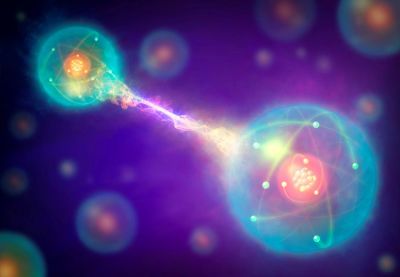Why being religious is perfectly consistent with a scientific worldview

To say that science is opposed to religion is a category error, much like saying a hammer is opposed to music. Science is not a belief system (like religion) but a tool — much like a hammer. And, like a hammer, it is designed to be useful in some contexts and not others. It can, in fact, be involved with the creation or performance of music, but only in limited aspects of it, and it is certainly not designed for that purpose.
Science is a methodology designed specifically to gain knowledge of the natural world, and thus part of the scientific method is a widely accepted principle that science is limited to exploration of how the natural world works. Since (by definition) religion is generally concerned with matters outside of what we call the natural world, it is not open to investigation by science.
We often hear atheists proclaim that there is no scientific proof or evidence for God, the soul, Heaven, or any other religious claim. This objection makes very little sense, for a variety of reasons. First, science is not in the business of proof in general, which belongs solely to mathematics and logic. I once challenged an atheist to find a single scientific paper, outside of mathematics and logic, that contained the word proof or proven, and he could not.
As for evidence, there are two kinds — strong and weak. The popular saying that extraordinary claims require extraordinary evidence, despite the favor it found with Carl Sagan, is meaningless — it’s not clear what “extraordinary” would mean, and in science, even the most unlikely claims simply require strong evidence to be considered true. For example, the idea that DNA could be the genetic molecule was universally rejected up until the 1940s for what were considered good reasons at the time, and then universally accepted in response to the strong evidence supplied by Watson and Crick in 1953.
But scientific evidence, strong or weak, cannot be applied to phenomena outside the natural world. The problem we face in dealing with many atheistic arguments is that they assume the reality of philosophical naturalism, which posits not only that the natural world is all that science can address (methodological naturalism), but that the natural world is in fact all there is. Underlying the circular reasoning is scientism — the idea that the natural world consists of only those parameters that can be addressed scientifically, and anything that cannot be addressed scientifically isn’t real.
When we say that phenomena such as human consciousness, love, art, and spiritual experiences are something other than components of the natural world, we are told that this is false, and scientistic reductionism is then used to insist that all of the above are actually “nothing more than” the results of natural processes such as neural impulses, genetic or hormonal effects on brain function, and other explanations that supposedly fit perfectly into a materialistic worldview.
And here is where the strict materialism ideology advocated by many atheist apologists collapses — because the claims of that last paragraph are demonstrably false. They are false logically, scientifically, and philosophically. As a trivial example, I once asked an atheist who was a devout proponent of scientism to explain how one can judge the quality of a painting using only the methods of science. He said that was easy. Just find out the price of the painting and compare it to others — the higher the price, the better the painting. That is a pretty good illustration of the use of philosophical naturalism to explain away such things as why beauty exists or why I love my wife the way I do.
Stephen J. Gould famously said that science and religion are two entirely separate magisteria that should not encroach on each other’s domains. But science and faith are both interested in the same thing, the finding of truth about the world, and thus we might assume that if the two disagree, then they cannot both be correct. So how do we respond when atheists point to Christian beliefs that they say are scientifically contradicted and cannot be real?
The first scientists — the originators of the scientific method — and most scientists up until just before the dawn of the 20th century were Christians who believed that God created everything, and they saw the findings of science as showing that the universe is governed by laws given by a divine lawgiver. Scientists like Galileo, Boyle, Faraday, Maxwell, Pasteur, Kelvin, and so many others did not see a contradiction between their science and their faith. Part of the reason is that the great majority of these so-called contradictions are the result of a particular set of beliefs that did not exist in mainstream Christianity before the 20th century. All the precepts of modern-day young-earth creationism came into being with a new (not traditional) style of biblical interpretation that calls itself “literal” (although it is nothing of the sort). I have often had to sit through a long litany by an atheistic debater on how the earth is not 6,000 years old, evolution is true, and so on, only to respond, “I agree, and so do the denominations representing the majority of all Christians in the world.”
The core claims of Christianity are certainly not contradicted by scientific evidence. The basic concept that God created the universe and everything in it was at one time thought to be contradicted by the consensus among scientists that the universe is past eternal, with no beginning. The discovery of the big bang (supported by very strong evidence) showed that the universe indeed had a beginning.
Other examples of so-called “pointers” to the truth of religious claims have been coming to light over the past century. These include the mysterious reality of quantum physics and the role of uncertainty in reality; the fine-tuning of the cosmological and other physical constants allowing for the existence of stars, planets, and life; the origin of what we call life from lifeless chemistry; the nature and origin of human consciousness; the undeniable reality of purpose, agency, and cognition in the simplest of living organisms; and the origin of symbolic information in the form of a genetic code.
What is quite fascinating to me is the reaction of some atheists to these pointers. In some cases, the atheist response has even been to deny the science! I have argued with atheists claiming that the genetic code is not a real code, that fine-tuning is easily explained by Douglas Adams’ puddle analogy (it’s not), that the universe is really past eternal after all, that quantum uncertainty is actually an artifact of experimental methodology, and other nonsense. How refreshing to be able to turn the label of “science denier” back on those who thought only us Christians commit such crimes!
My upcoming book Beyond Evolution: How New Discoveries in the Science of Life Point to God goes into great detail on some aspects of modern biology that are uncovering a treasure trove of new pointers to the reality of divine creation. I am confident that this trend will continue, and that in the end, as God intended all along, the truths that science reveals about our natural world and the reality of Jesus Christ as the personification of all Truth will be seen by all as being in perfect harmony.
Originally published at The Worldview Bulletin Newsletter.
Dr. Sy Garte is a biochemist and has been a professor at New York University, University of Pittsburgh, and Rutgers University. He has authored over two hundred scientific publications and four previous books, and has served as division director at the National Institutes of Health. Sy is also the editor in chief of God and Nature magazine and vice president of the Washington, DC, chapter of the American Scientific Affiliation. He is a lay leader in the United Methodist Church.



























